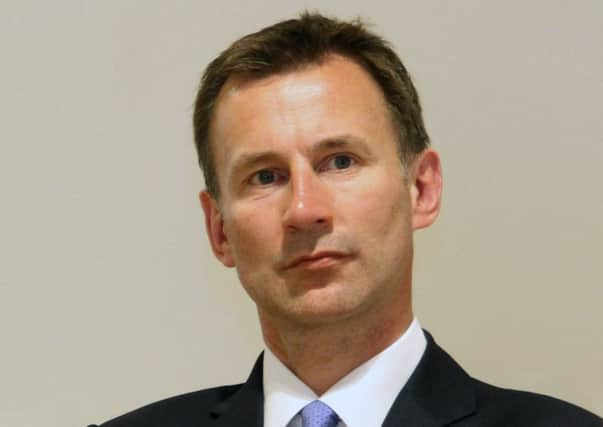Hunt orders annual review of ‘avoidable deaths’ in hospital


The yearly study of about 2,000 patient case notes will see England become the first country in the world to monitor the extent of avoidable deaths in the hope of cutting the rate.
Mr Hunt said 1,000 patients are dying unnecessarily each month in NHS hospitals.
Advertisement
Hide AdAdvertisement
Hide Ad“It is about changing behaviour and the way everyone works in the NHS,” he said.
Comparing the attitude to safety in the health service to other industries including airlines where global deaths have fallen from 2,000 in the 1970s to 500 now, Mr Hunt said the key was encouraging staff to raise concerns.
He said: “This is the biggest scandal in global healthcare. Why hasn’t the health service adopted the kinds of standards we now take for granted in the airline and nuclear industry?
“I want all hospital boards to have a laser-like focus on eradicating avoidable deaths in their organisation; even one life lost to poor care or safety error is too many.”
Advertisement
Hide AdAdvertisement
Hide AdThe Department of Health said under the annual review hospitals will be placed into bands depending on the number deaths estimated locally.
“By March 2016, every hospital board will have the first of an annual series of projected avoidable mortality rates to inform and drive local improvement,” it said.
Another report by healthcare analysts Dr Foster yesterday found there had been a “significant reduction” in the overall death rate in 11 NHS trusts that were put into special measures, including the Northern Lincolnshire and Goole NHS Foundation Trust, saving 450 lives.
Only the death rate at the Tameside Hospital NHS Foundation Trust had seen a “rising trend” in its mortality rate despite emergency action taken, it said.
Advertisement
Hide AdAdvertisement
Hide AdRoger Taylor, Dr Foster’s director of research and public affairs, said: “Our analysis gives us some hard evidence that special measures can be an effective tool for turning around NHS trusts that experience problems.”
Researchers found the overall death rate across the 11 trusts has fallen by nearly 10 per cent since special measures were introduced, compared to the national average fall of 3.3 per cent.
Five of the 11 trusts, including the Northern Lincolnshire and Goole trust, are no longer in special measures, while a further seven have been placed in failure regimes.
Prof Edward Baker, deputy chief inspector of hospitals, said: “We are impressed by the leadership shown in many of these trusts that has led to these measurable improvements in quality.
Advertisement
Hide AdAdvertisement
Hide Ad“Our new inspection model has helped us get under the skin of hospitals so we now assess whether care is either outstanding, good, requires improvement or is inadequate.”
Prof Sir Bruce Keogh, national medical director at NHS England, said: “Mortality statistics require careful interpretation, but they do provide an important smoke signal.
“What this report shows is that by following the smoke and carrying out proper, transparent analysis and supporting as necessary, you can help hospitals make significant improvements for their local communities.”
A report on the treatment of NHS staff who tried to air their care concerns will this week be published by Sir Robert Francis, who led the a damning report into the Mid Staffs Hospital scandal which found at least 1,200 patients died because of poor care at the hospital.